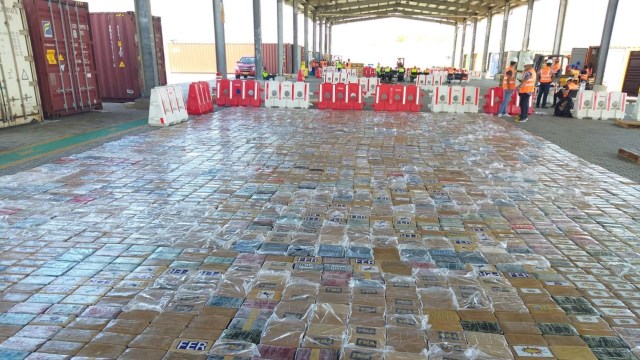
Turkish criminal organizations, with the help of Latin American criminal groups, areexpanding cocaine distribution in Europe and the Middle East. International law enforcement agencies have been seizing record quantities of the drug heading from South América to Turkey, a late June report from InSight Crime, an organization that investigates organized crime in Latin América and the Caribbean, indicated.
By Diálogo Américas – Julieta Pelcastre
Jul 28, 2022
New routes
These groups have created new routes from South América, Ecuadorian newspaper El Universo reported. The maritime route, with the use of large containers departing from ports in Ecuador, Colombia, Panamá, and Brazil, among others, is the preferred route for international narcotrafficking.
Among the latest seizures, on June 23, the Ecuadorian National Police seized 850 kilograms of cocaine hidden among bananas in a container bound for Turkey in the port of Guayaquil, Police said. According to El Universo, the products with the highest incidence of this illicit trade are fruits.
In the Turkish port of Mersin on April 16, authorities seized 258 kg of cocaine from a container with bananas, Turkish Minister of the Interior Süleyma Soylu said via Twitter. The container was coming from the Ecuadorian port of Guayaquil, InSight Crime said. “We continue to eradicate the biggest source of terrorism funds,” the Turkish minister said.
In February, Ecuadorian anti-narcotics agents seized 44 packages of cocaine in a container of bananas at the port of Guayaquil. The drugs were bound for Turkey, according to the Ecuadorian police.
The number of cocaine seizures in Turkeyhave been increasing. In 2021, one of the main finds was 1.3 tons of cocaine from Ecuador. In 2020, Turkish authorities seized 2 tons, in 2019, more than 1,600 kg, and in 2018, 1.5 tons of cocaine, Turkish Police reported.
The tip of the iceberg
These seizures, according to experts consulted by InSight Crime, are just the tip of the iceberg, as Turkish organized crime, which historically dominates heroin trafficking in Europe, is increasingly turning to cocaine to compensate for falling opiate prices.
Fredy Rivera, a security and organized crime expert and professor at the Latin American Faculty of Social Sciences in Ecuador, told Diálogo that the seizures speak of “a diversification of markets, the expansion of the porosity of control systems, and the opening of a new link through a bridge via Turkey.”
Although Ecuador does not have strong links with Turkey, “hiding [cocaine in banana shipments] through other countries will increase because it is one of the main export products, and it must be taken into account that there is indeed a strategic rise of Ecuador in organized crime in its different variants, basically cocaine,” he added.
Factors and links
Following historic U.S. and European seizures, traffickers began looking for alternatives to get their product to Turkey, InSight Crime said. With demand for cocaine on the rise, Turkish narcotraffickers crossed the Atlantic.
Another factor behind the increase in cocaine trafficking through Turkey is Venezuela’s economic collapse, which has led the Nicolás Maduro regime to “depend on links with organized crime to traffic drugs, gold, and oil, and thus finance its budget,” Eduardo Buscaglia, an academic at Columbia University in New York, told Spanish newspaper El Pais.
The links to get the drugs to Turkey “are complex,” Rivera said. “The operators of Turkish criminal organizations are external operators, with alliances, front men, lawyers, and corrupt officials in Latin América.” Among them, according to El Pais, are the dissidents of the Revolutionary Armed Forces of Colombia (FARC).
Turkey is also of interest to México’s Sinaloa cartel to launder its illegal proceeds. This group “has become a multinational criminal enterprise, diversifying into all types of crime. Turkey represents a low-cost country because it’s an important regional economy, well connected to Europe,”Buscaglia said.
Fighting at the root
Reducing the global narcotrafficking threat will require sustained political commitments from partner governments, backed by U.S. assistance to address all links in the chain,from suppliers to consumers. This means curbing illicit drug production, interdicting drug shipments, addressing illicit financing, and reducing drug demand everywhere, the U.S. Department of State says on its site.
Interagency coordination and international cooperation in the fight against narcotrafficking in the Caribbean and Latin América “is vital,” Rivera said. “Direct, exact, and diversified cooperation is needed, with a good analysis of vulnerabilities and needs, with much more intelligenceexchange, trust, and recognition of the effort made by the states to combat this scourge,”he concluded.
…
Read More: Diálogo Américas – Turkey, New Route for South American Cocaine
…

